Being Transgender in Stroud
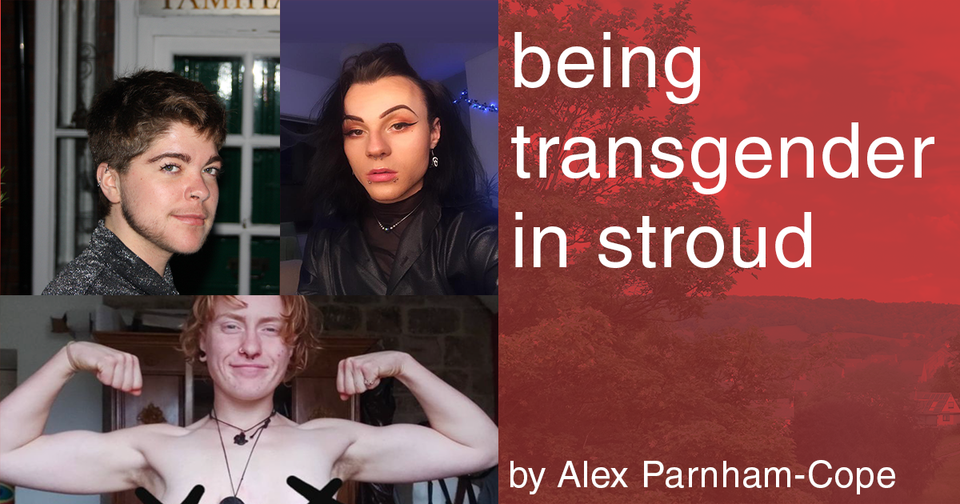
by Alex Parnham-Cope
Content Note: transphobia, discussion of violence and mental illness
For those who aren’t aware, a transgender person is someone who identifies and lives their life as a different gender to the one they were presumed to be at birth. As a young person who grew up trans in Stroud, I wanted to ask how our town’s unique identity is reflected in the experiences of our small but vibrant transgender community. In general, trans people in Britain can experience much difficulty in our lives, from body dysphoria and a dislocated sense of our own identity, as well as being at increased risk of family rejection, homelessness, mental health issues, institutional discrimination and hate crimes. However despite these dark realities, there’s also a distinct joy, collectivity, and self growth that transgender people share as well, as we fight for a world where we can be our authentic selves.
To explore this idea in relation to our hometown I’ve conducted interviews of residents living in and around Stroud; trans people of all ages and walks of life, and their loved ones. This has included a variety of participants from parents of trans children to trans university students, in occupations varying from gardener to circus performer, and a range of ages from early teens to middle aged. I’ve also strived to connect what’s happening in Stroud to the larger picture of trans issues nationally, and lay out a better understanding of our community for the benefit of all Stroud residents searching for a fairer and brighter future.
Community
Stroud is well known as a ‘hippy’ town with a unique and vibrant local identity, celebrating the Cotswolds’ music, food, artistry and scenery. In some ways, the town’s accepting and left-field culture has had a positive impact on local trans residents feeling comfortable and free to express themselves, to dress and identify as they wish. For example Robyn, a transgender woman and circus worker living in the Stroud district, told me that she feels fortunate not to have had any negative experiences walking around or using services in Stroud after coming out. She explains that she’s “always found Stroud to be a chilled place to live, and the melting pot of different types of people makes it more accepting.”
Although local businesses and events have taken a huge hit with the Coronavirus pandemic in the last year, many of the people I interviewed found that the closely knit local community has provided an invaluable support network to trans people living, working and growing up here. Fry, 24, is a transgender man based in Stroud who works as a gardener and an NHS frontline worker during the pandemic. He explained that the LGBT+ community in Stroud has been growing in recent years, supported by the successes of small Stroud Pride parades and activities in the summer months, and the introduction of drag events at local pubs.
However others thought that Stroud’s kooky culture, while a positive in itself, has failed to translate into materially supporting trans people and the struggles they face. Hayleigh is a 22 year old graduate and transgender woman working in sales. She believes that although Stroud has allowed her to “branch out into “weird” or indeed “queer” things in an aesthetic way, she also points out that we are starved of substantive queer culture and community organisation; “I get way more harassment here (strange looks, heckling, names) than I did while studying in Birmingham. I think this is because Stroud is ultimately very sheltered and politically isolated.” She goes on to explain that “Stroud hippy culture, at the surface, is fun and unique and charming, no doubt … I would like to think it makes Stroud a more supportive community, and it does in some ways but I can never shake off the performative nature of Stroud’s attitude to queer culture.”
In a lot of ways then Stroud is a unique place, with lots of free-spirited people, and this sense of social support (where it exists) is particularly important to transgender people who often don’t have the support of their families, and where funding for local services has been slashed. Nicholas, a 20 year old local transgender student, says that “Stroud has so many people from different walks of life” which “allows trans people a sense of normality no matter how they explore or present their gender”. However again, queer aesthetics and rainbow flags don’t necessarily translate into material support where it is needed most.
Nick also explained that community services and support groups have been forced to pick up the slack to provide essential services and guidance to trans people and their families due to the government pulling public funding to many of these vital resources. Nick is a youth volunteer at Gay Glos, a charity running youth groups and support initiatives in service of the LGBT+ communities in Gloucestershire. He’s been involved for over 6 years, and explains that as well as running youth activities they also organise education and training in schools and workplaces, and liaise with local bodies and social workers to support LGBT+ people in need. Due to the lack of appropriate alternatives they often have to take on a large responsibility to care for young trans people in desperate situations.

While years of austerity have been felt by communities across Britain, transgender people have been particularly impacted. A staggering 25% of transgender people have experienced homelessness, while trans-specific support groups or counselling run by the NHS Gender Clinics have waiting lists of two to five years. While experiencing long-term homelessness himself, Nick explains how crucial community was to his basic survival: “it absolutely changed my life, it gave me support in ways I didn’t think anywhere could. Gay Glos helped me when I was sofa surfing and when fighting social services for better support they were always in my corner. They saved me when I thought I had no one and nothing – just because the youth group only met up biweekly did not stop them from being in my corner when things were at the lowest point.” It is clear then how solidarity and community organising in Stroud and the surrounding areas become vital in providing much-needed support for local transgender residents, particularly in instances where desperately under-funded local services have failed to fulfil the responsibilities required of them.
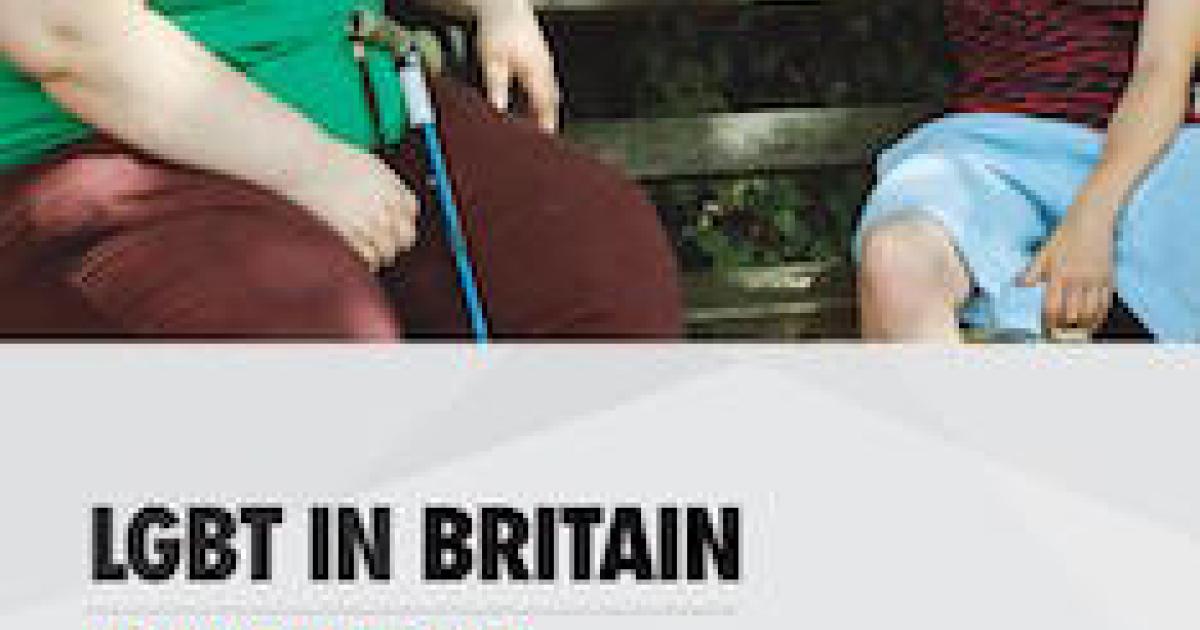
Hate crime
However, despite the strengths of such community and charity initiatives in Gloucestershire, many of those I talked to reported incidences of aggression and hostility which have become all too common for those in our community. Nationally more than four out of five trans people in Britain have experienced a hate crime in the past 12 months, and the rates of such crimes have increased by 81% in just one year. Several trans residents reported that the most common occurrence was being yelled at by men in the street, harassed and called slurs, which indeed marries up with my own experience of such abuse on countless occasions. Such incidences are also thought to be particularly bad on nights out in Stroud, and that certain venues were deemed unsafe.
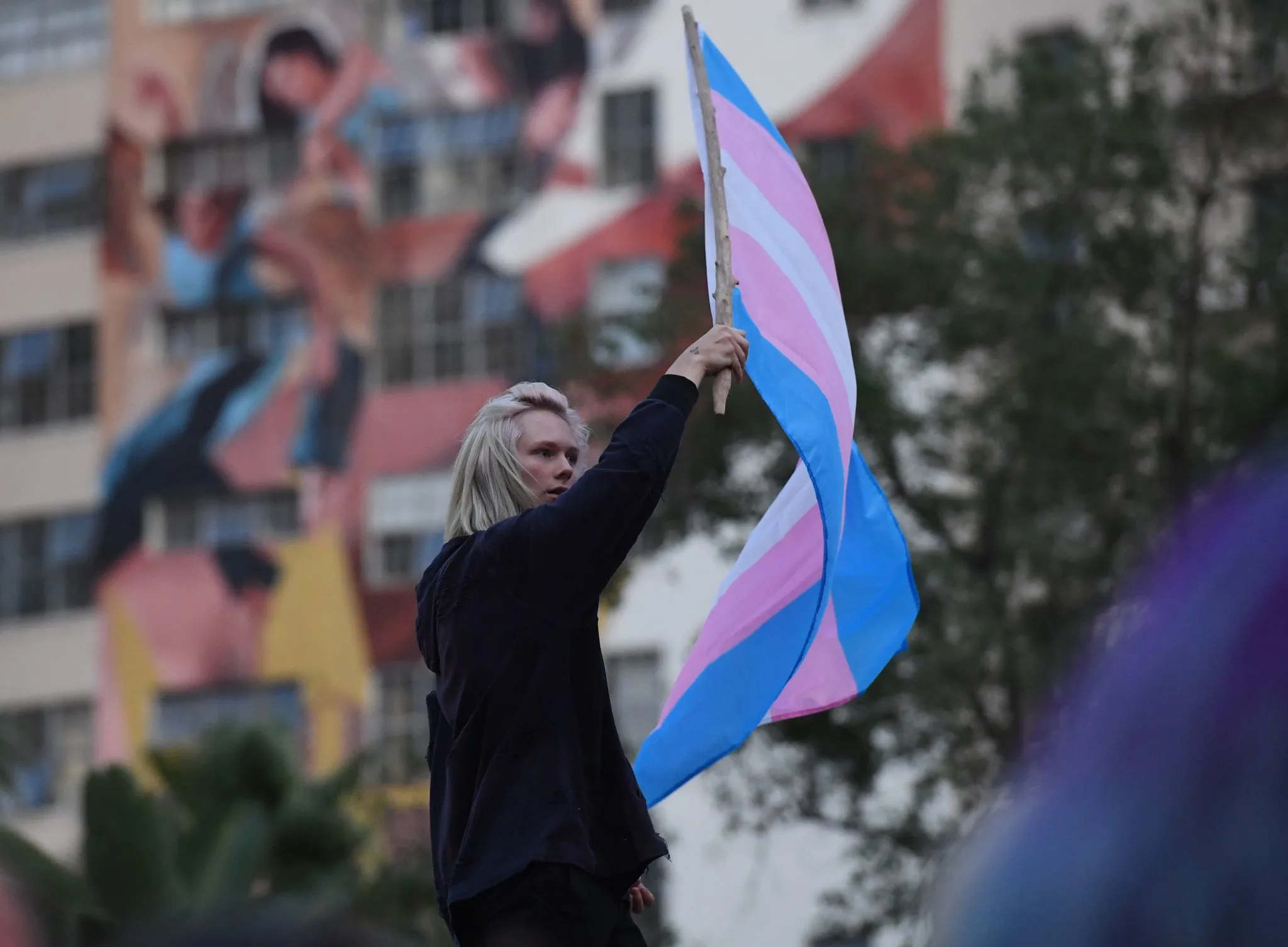
Recent research indicated that half of all trans people in Britain are scared to use public bathrooms, and in particular the Lord John and the now-closed Warehouse in town were cited as anxiety-inducing and even dangerous places to be on your own as a trans person. In fact, both myself and Fry realised we had, at different times, been kicked out of the same venue simply for using the male toilets – despite this being our right under the Equality Act (2010) for us to do so. In this sense the harassment and mistreatment that local trans people reported to me has effectively become a normalised part of their daily life.
Hayleigh elaborates:
“I definitely expect to be treated a certain type of way (ostracised) when I leave my house. This isn’t done by any particular type of person (class, style, etc) but what I will say is that as a culturally isolated town, we assume certain attitudes towards certain minorities are excusable. I happen to be in one of those minorities.”
As well as every day microaggressions and casual ostracisation, there are also significant instances of substantial abuse and physical violence that are an unfortunate reality for many trans people. Fry told me about one particular incident at night in Stroud, where a young man harassed him about his gender, demanding to know if he was a boy or a girl. The man then began physically attacking him, punching him and even following him down the high street and beating him again later that same night. Fry and his friend, who is also trans, were both emotionally and physically disturbed by this attack and even had to go to a local hospital to have their injuries cared for.
Although Fry’s experience is particularly shocking, this fear of violence or harassment is part of the daily lives of many trans people in the Stroud area, with disabled trans people and trans people of colour being particularly at risk. On this point, although there are no BAME-specific trans organisations in Stroud or Gloucestershire as of yet, Black Trans Foundation (@blacktransfoundation on instagram) and Kiki Bristol (kiki_bristol on instagram) are two of many organisation that are available to BAME Trans people in need of support, fundraising help or community.
Workplaces
Moreover, the local residents I interviewed explained the variety of ways their trans identity has impacted their work and educational life, sometimes for the better although unfortunately they have also met with incidences of hostility and discrimination. Robyn, 53, said that the circus-theatre company she works for had been “utterly unfazed” by her coming out and starting hormone treatment a few years ago. She went on to say that the accepting and supportive environment offered by her colleagues has been really amazing, clearly illustrating that it needn’t be hard at all for workplaces to support their transgender staff. Indeed, when I was working at Ecotricity, one of Stroud’s biggest employers, I found my colleagues to be incredibly supportive from the get-go, even formalising gender neutral toilets at my request, and being discreet and professional in ensuring my correct name and gender was used consistently, which was massively important in the beginning year of my public transition.
Fry reported a more mixed experience of coming out in the workplace, although he believes that LGBT+ campaigns in recent years have had a positive effect on levels of education and acceptance. When he first came out as transgender while working on a local NHS hospital ward, he was met with mixed responses, including being ignored and avoided by colleagues and even subject to repeated homophobic slurs which eventually forced him to leave his post. However after moving to another ward, and following the successful work of the Rainbow NHS scheme, he’s found work to be much more comfortable now, and has enjoyed the diversity and openness of NHS staff members in working alongside colleagues and patients from a variety of backgrounds. As well as this, it is worth outlining that all workplaces have a legal obligation to promote tolerance and equality in the workplace, as well as ensuring transgender people feel safe at work. Any trans worker who feels victimised by their employer should be encouraged to reach out to the Citizens Advice Bureau, local trans support services/advocacy groups, or their Union to get support on ensuring this standard is met.
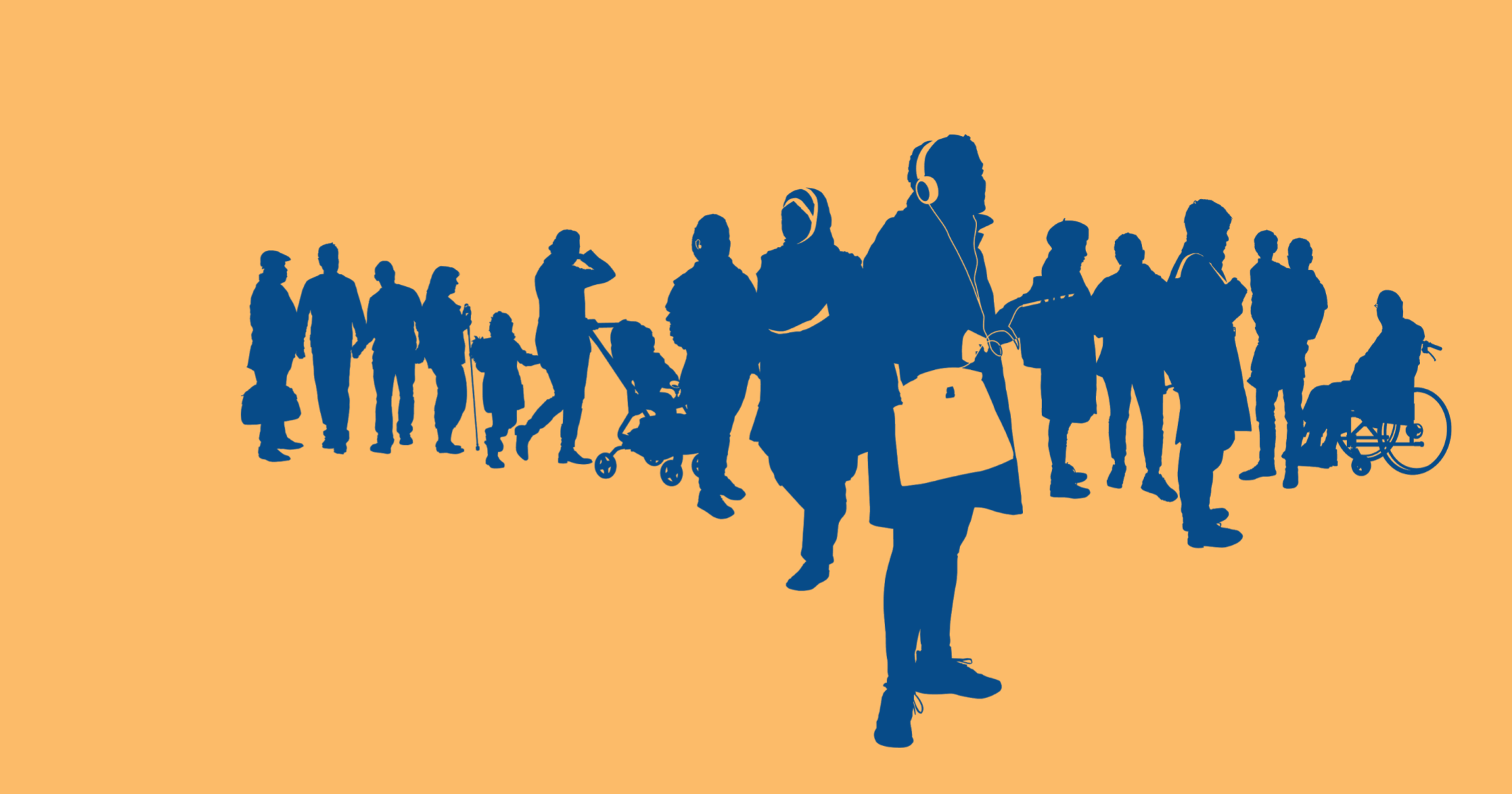
Further to this, young people who are transitioning at local Stroud schools have often found themselves at odds with outdated policies and agitational staff members who make it difficult for us to be ourselves, to feel safe and supported in school and, crucially, to be allowed to focus on our education in a private and respectful way. Both myself and Nick, 20, attended local educational institutions where we were explicitly barred from using the male toilets and often found ourselves subjected to uncomfortable or deeply inappropriate comments about our gender and transition from members of staff, including speculation about our genitals from our teachers. Nick explains that “I spent some time studying in Stroud and I found my gender was constantly a challenge between myself and teaching staff, who clearly felt confident in their prejudice and the lack of accountability that would be held against them.”
Sadly I was given similar reports when I interviewed Helen, the mother of James, a transgender young person who is attending a local secondary school (names have been changed for privacy reasons). Although he was deemed to be a girl at birth, James has been expressing himself as a boy since he was just three years old. At seven he was still consistently identifying and presenting as male, and with his mothers’ support and acceptance he ‘came out’ while still in primary school. Helen told me that the kids his age never had a problem with him being trans, and all through school he was largely accepted and respected by his peers and had no particular issues making friends. Instead, Helen explained that it has almost exclusively been adults and school bureaucracy which had created unnecessary tensions and issues for her son, when in reality he just wants to fit in and focus on his studies and his friends like any other child. While his peers have little problem accepting his trans identity, Helen recalled that other parents have challenged her, even confronting her and aggressively demanding “how are we going to explain it to our kids?”, when clearly it was never the children who had a problem with it!
When James moved on to a local secondary school, members of staff declared that he had to use the girls’ toilets and changing rooms, even though all his peers knew him as a boy, and many didn’t know that he was even born female at all. James and Helen didn’t want to start a fight or be confrontational, nor did she want to contact local media about the dispute. She only wants what any parent wants: safety, dignity and privacy for their child. In response, the school got their legal team involved, with some members of staff appearing intent on making James use facilities that are not appropriate or safe for him.
Of course these situations can be highly sensitive, and James told me he’s happy using the disabled changing rooms for his PE lessons, but he will carry on requesting his right to use the male toilets where he is more comfortable, and legally entitled to have access to. Generally James is happy at school and not particularly picked on. But the behaviour of certain members of staff has created distress and unnecessary difficulty, which is the total antithesis of what a safe learning environment should be like. Young trans students shouldn’t be the subject of dramatic and sensationalised debates over bathroom access, or forced into the media or legal limelight just to defend their rights to privacy and dignity. It is clear that schools and colleges in the Stroud area have a long way to go to ensure these standards are met.
Medical access
A final major hurdle faced by trans people across the country is the extensive waiting lists to access any kind of transition care on the NHS. Formally speaking waiting lists for initial appointments are stated to be 18 to 36 months, but myself, Nick, Hayleigh and Fry have all been waiting since at least 2017 without so much as a letter from the Gender Clinics at time of writing. As Hayleigh puts it, these waiting times amount to an effectual neglect of trans people by the healthcare system in this country. They’re not just frustrating but dehumanising; the longer trans people have to wait for hormone treatment, the longer we are forced to undergo irreversible puberty as the wrong sex. This is of course an incredibly distressing experience, and is sadly not unrelated to the tragic statistics that 72% of British transgender youth have self-harmed and 34.4% have attempted suicide at least once.
These waiting times are a direct result of austerity and cuts in funding, but also the recent court case banning reversible hormone-delayers for under 16s illustrates that trans health has been hyper-politicised in a deeply concerning way. Dangerously misinformed media pundits and hateful billionaire authors weaponise the language of moral panic, to the point now where they effectively have more of a say over trans people’s private medical journeys than we ourselves do. In response, every adult trans person interviewed in this article, including myself, has been forced to fork out thousands of pounds to pay for our affirming and indeed life-saving treatment ourselves. Raising these funds independently is a considerable task, especially for young people like Nick who have grown up homeless and with significant financial and social disadvantages as a direct result of transphobia. Meanwhile Fry is trying to raise funds for his chest surgery while working a zero hour contract frontline NHS job during the pandemic; if you’d like to support his fundraising efforts, even if only by a few pounds, then you can help him reach his goal by contributing to his crowdfund.
As well as this, accessing trans medical care is made particularly hard in rural areas like Stroud where there are very limited formal services and considerable travel is needed to access clinics in major cities. For example, Helen says that when James has gender counselling services in London she would have to take a day of work and bring her other child along for the day as well. As he’s currently going through the child services, which have comparatively shorter waiting times of a year or so, James is able to access counselling and therapy to discuss his feelings and identity with a medical professional, and get reassurance that however he identifies he will be loved and supported.
Contrary to what media fear tactics may tell you, gender clinics do not try to rush young trans people into making medical decisions about their bodies; in fact reversible puberty-delaying treatment has been barred from James now, and although he desperately wants to start hormone therapy in the future Helen anticipates that they’ll have to fight for this to be made available. Ultimately, however, access to reasonable waiting lists isn’t just about medical changes, although this is important. Fry instead explains that what’s crucial about the role of the Gender identity Clinics is for trans people, especially in rural areas, to no longer feel alone and to be able to talk through their identity and distress with someone who understands.
Building a better Stroud for all
As well as understanding the unique experience of growing up trans in Stroud, I also wanted to search for perspectives on how residents can work together to fight ignorance and transphobia in our town. For Robyn, her request was very simple; “treat me like anybody else”. She believes she is very lucky to have been accepted wholeheartedly by her friends, family and workplace, and wishes her experience was the norm for all trans people. For Helen and James, “education and activism” is the key to fighting for this acceptance.
In particular, Helen explains that schools and other institutions are lagging behind the progress that young people are making in championing diversity and acceptance, and generational learning and change will be essential in supporting trans young people. In light of this James referred to the importance of anti-racism and the Black Lives Matter protests earlier this year; it is certainly true that racism and transphobia are overlapping issues and we must be unapologetic in ensuring our fight against transphobia is an anti-racist one as well.
In terms of the role non-transgender people can play, Nick emphasises the need to “avidly show your support – you do not need to be trans to recognise and fight for positive change for trans people. Challenge transphobia, and take part in community based discussions about trans rights and what your local communities need to do for the trans people within your community.” Crucially, he says, trans rights are human rights, and public and health services in particular should be seeking education on supporting their transgender users. As well as this, a reversal of austerity and full funding of medical and social services was emphasised by several respondents. Hayleigh explains that in her view, “the most important step to me is to reverse the damage the Conservatives have inflicted on our community. Starting with the human right to self identify. I know I’m trans better than any cis politician and nobody should get to speak on behalf of a trans person’s identity before they can.” As well as this, opening more gender clinics, speeding up the waiting list and funding youth centres is an absolute necessity. “Trans people need [safe spaces] to identify, this isn’t some sort of choice or decision to play dress up because it makes us happy, it’s quite literally a matter of life and death for so many trans/nonbinary people.”
In terms of the positive and transformative role non-transgender people can play, both Fry and Nick emphasised the need for communities to listen to transgender people, to discuss with us our concerns and needs, and to address them collectively. Trans issues may appear in the media occasionally, but all too often these sensationalist stories vilify trans people and our medical journeys, and pit us against the non-transgender population. This is particularly reflected in the way that transgender women are demonised and presented as a threat to non-trans women, even though trans women have been living and working happily alongside non-trans women for years, and trans women are far more likely to be the victims of abuse than the perpetrators. Instead of giving way to false and divisive narratives, transgender and non-transgender people should instead focus on what unites us as people, as local residents and as workers, and should strive to build a more inclusive and strengthened sense of community together. Such community building and trans-positive activism shouldn’t be sidelined until a time of convenience, but be considered a priority now: in Hayleigh’s words, “trans people are running out of time.”

Conclusion
Overall, it’s clear that trans people in Stroud and beyond go through a range of personal difficulties and battles that non-transgender people are far less likely to experience. There are several businesses and institutions in Stroud, from schools to nightclubs, that have repeatedly ostracised transgender people and created unnecessary difficulty and division. However Fry believes, as do I, that the fight to overcome these experiences gives us a massive amount of strength, as we build up our own characters and get to become our authentic selves in the eyes of our loved ones, and work to transform our communities around us.
In direct contrast with the negative view painted of trans people in the British press, when conducting these interviews I was struck by the quiet strength, the warmth and the diversity of our community in the face of difficulty, and the advocation and unity and open mindedness to overcome our collective struggle. We cannot allow our communities to be divided and denigrated by hateful right-wing publications, nor stand by while trans people’s basic rights and protections are quietly eroded. We may be a small community and come from varying walks of life, but there are many trans people who are glad to call the Stroud valleys our home. Here’s to moving forwards for the safety, respect and uplifting of trans people in Stroud and beyond.






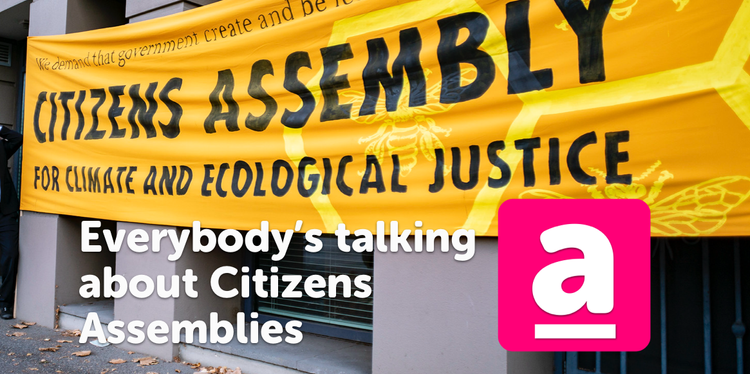
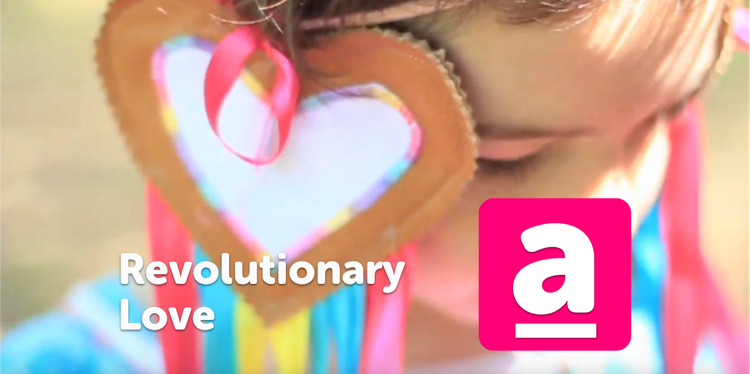

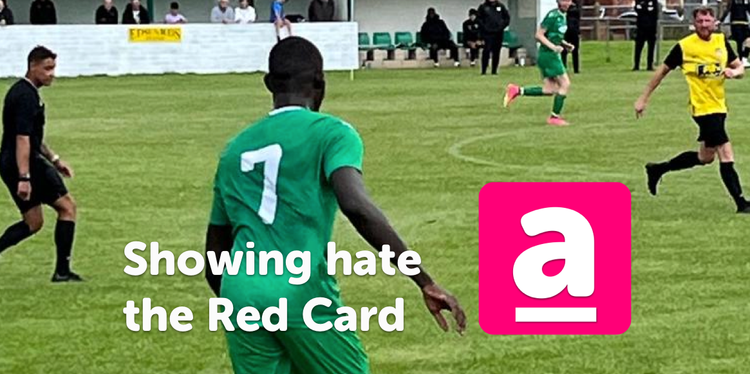
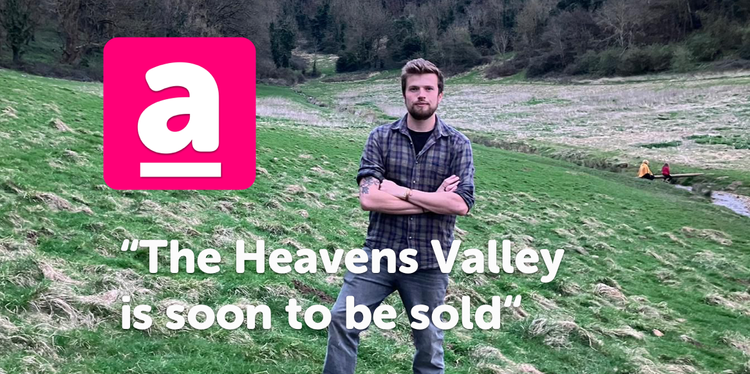
Member discussion